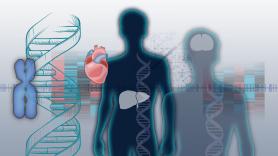2. A Showcase against Disease
"According to data from the World Health Organization, the number of people with diabetes has quadrupled since 1980. It now affects more than 400 million people," explained Ana Viñuela, a researcher at the University of Geneva. The attempts to explain their genetic predisposition are a clear example of the obscurity in these relationships. Up to 90% of genetic variations associated with diabetes are in the dark DNA, beyond the traditional genes. To find out what role they play, projects like GTEx that combine many layers of information can be highly useful. But with illness like diabetes, which are quite complex with so many mechanisms in play, which tissues should be analyzed? Fat, muscle, pancreas? And if we analyze the pancreas, how should we get and study the tiny part of this organ that is responsible for producing insulin?
Some of the conclusions from their studies are, for example, that some regions of the pancreas are the most highly associated with signals shown in genetic studies, but not the only ones. And the adipose tissue under the skin is a fairly reliable mirror for these regions, which could be used to obtain information much more easily.
"Cardiovascular diseases are the leading cause of death in the world, and account for 10% of all spending in the healthcare system in Catalonia," explained Joao Curado, bioinformatics specialists at CRG Barcelona. His team is working with GTEx data to try to identify a panel of blood-based RNA markers to diagnose cardiovascular disease easily, non-invasively and, above all, early. This would push treatment forward, making it cheaper and more effective.
To do so, they've divided the project into three phases. In the first, they've identified 100 potential markers of the disease. In the second, currently underway in collaboration with several hospitals in Barcelona, they are trying to reduce and simplify the panel with blood from patients and control subjects (healthy individuals). In the final phase, they will test its real value.
Other useful applications of the project lie in pharmacogenomics, the discipline that attempts to personalize drug dosing based on individual genetics. Assaf Gottlieb, a professor at the University of Texas, is working on a panel to predict the necessary dose of warfarin, a very common anti-coagulant. This would prevent doses that are too high, which increase the patient's risk of bleeding, or too low, with the risk of being ineffective. There are genetic panels already but they aren't very reliable. Adding expression data from the GTEx project is allowing them to "improve prediction of the necessary doses."
Furthermore, "the effects of genetic variants may be different in each person," explained Stephanie Castel, a researcher at the New York Genome Center. This is because it depends on their genetic context (other variables that affect them) and environment. Her analyses using GTEx expression data aim to discover why the same variants can lead to autism in some individuals but not in others. They are even combining information from GTEx with data from other databases to study whether certain modifications we are born with can foster cancer, paving the road for it once the triggering mutations make their appearance.



